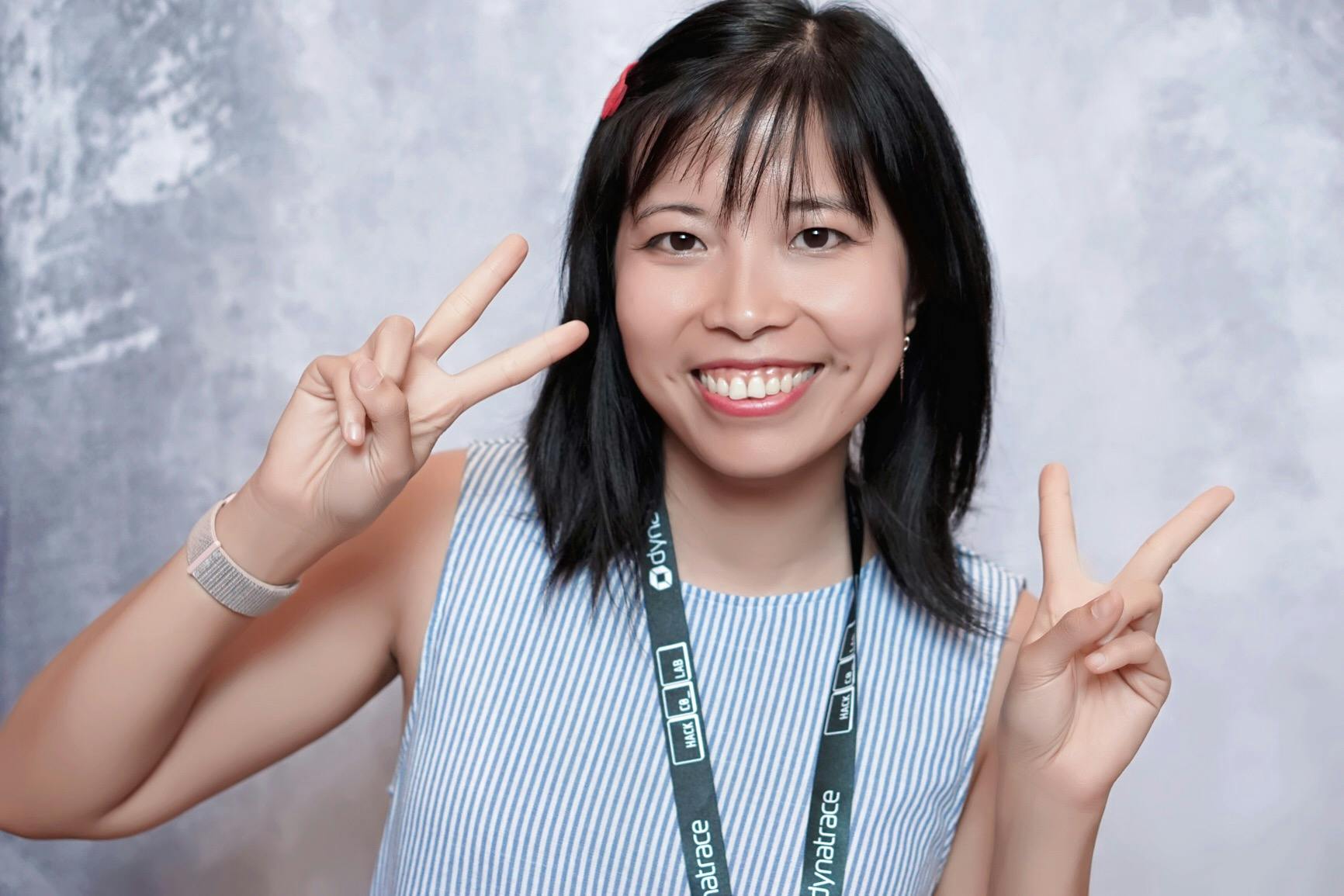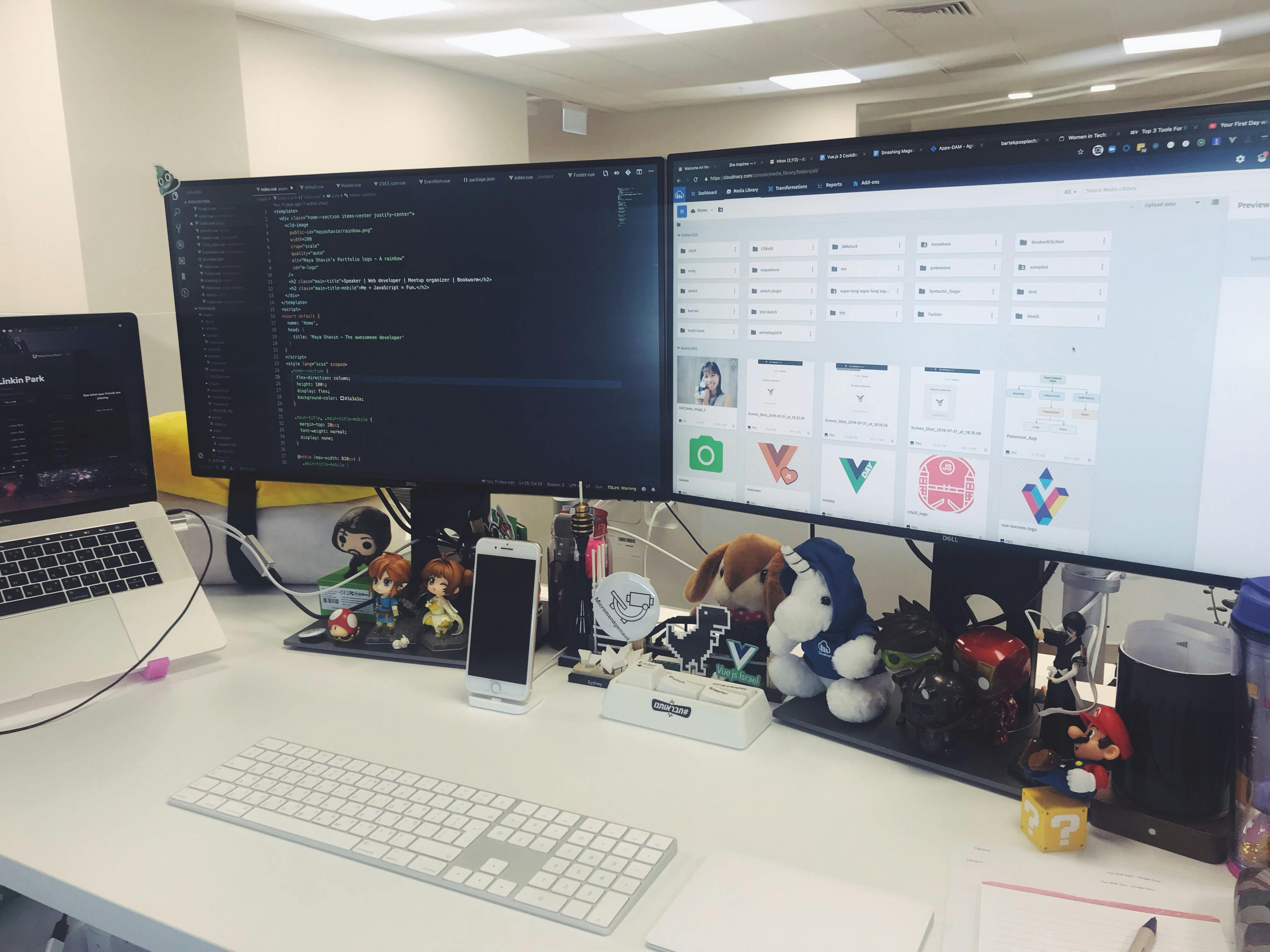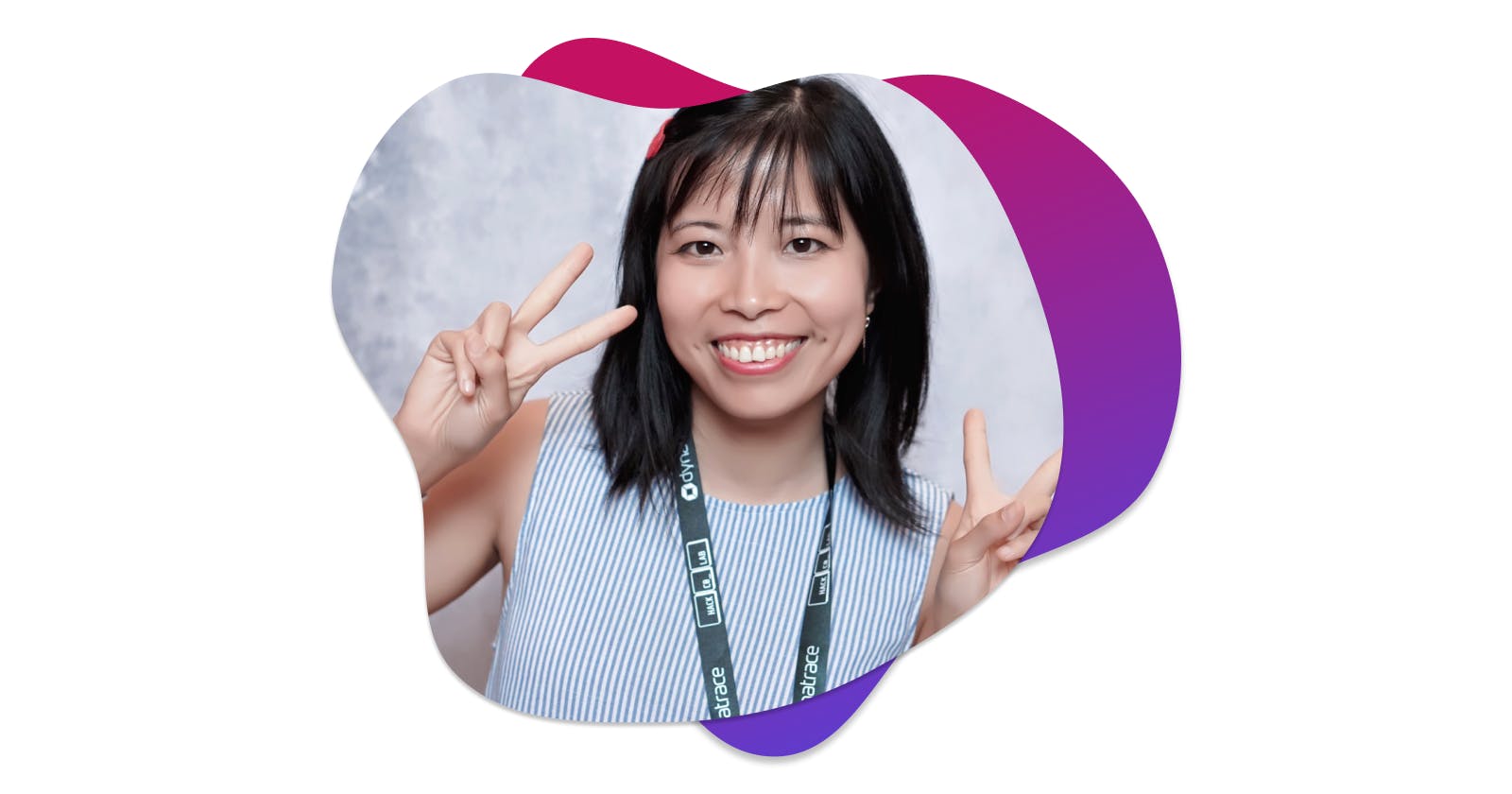Hello, Awesome 👋,
Thanks for taking out time to read this interview. This series is all about talking to the awesome women in tech and understanding the current health of the tech industry. If you want to share your story, please reach out to me at bolaji@hashnode.com.
Today we will be interviewing Maya Shavin 👩💻.
Maya is a Senior Frontend Developer at Cloudinary, while she's not writing code, she writes articles about JavaScript tutorials and good practices on Ultimate Courses, Frontend Weekly and Fullstack Training. Maya leads the VueJS community in Isreal and also an international speaker and accessibility advocate.
I interview leading women developer every week and showcase their history, opinions and advice on the tech. In case you missed our previous interviews, check out the " She Inspires " series on Hashnode. Also, if you find this interview useful, please don't forget to share with your friends and colleagues. 😃
Please tell us a little bit about yourself. How and when did you venture into tech?

I'm a Senior FED in Cloudinary at the moment of speaking. How did I get into tech? Well, that's a long story 😄. In short, I started coding the first time when I was 14, in Pascal but never had a chance to go back to it. Time passed. One day I moved to Israel. New place, with a new language, a new culture and I finally got the time to take a break and see what I want to do next. Somehow my husband thought I would enjoy programming after I solved a simple mathematics problem for his work (trust me, I still don't understand the connection). So I took his advice to pursue another B.Sc degree in Computer Sciences and soon admitted that he was right - I'm indeed enjoying being a software developer very much.
What difficulties have you faced on your way in tech? Have you ever felt like you were not treated as equal?
My first and most difficult thing back then was actually the language - Hebrew. I didn't take the normal way as most did, I did my degree in the local language, a language I had no idea. Simply just because I believe if I already do it, I should do it the local way, to adapt myself faster to the environment. So yes, it was a crazy period for me to push myself towards, struggling with exams that most of the time I don't understand, and with the anxiety that I'm a foreigner. Does it get better? Well, yes. Was it worth the try? Absolutely. Other difficulties are mainly about me dealing with the insecurity of my own capabilities, the fear of being unable to keep up to technology changes, fear of being "foreigner" of my team because of the language barrier, the look and especially how to balance work and family, etc. Despite these, I considered myself lucky as I am surrounded by supportive people. From college to the workplace, I rarely felt like being treated not equally. Once in a while, I did get the foreign treatment from random people on the street ( stereotyped me as one of the "domestic helpers" or poor foreign girl that needs help). My daily life is a constant battle of keeping yourself cool towards people's small mindset and know that you are doing awesome.
We see that you work at Cloudinary, how long have you worked here and what has been your experience?
I will be one year in Cloudinary this coming September and there is one word I can say: awesome. The people, the team is amazing, open-minded and super fun to be with. We have a breakfast party every morning, which makes it even harder to choose to work from home. Besides, I was given a lot of opportunities to improve myself, both professionally and personally. And one of those was the freedom and support for speaking at conferences, being Vuejs supporters (though we work with ReactJS mainly) and still able to be a visible mom to my kids.
We see that you work as a Senior Front-end Developer at Cloudinary, how long did it take you before you became a Senior Developer?
I was C++/C# developer in the beginning, and my journey with Web was only from 2015 when I switched to Javascript. Two years later I became a Senior Developer.
What advice do you have for Front-end Developers who would want to transit to Seniors?
Honestly, I don't really care about the title that much. Senior or junior, in the end, are all developers. And we always have something to learn from each other or from industry, constantly. I doubt that any senior actually use Google or Stackoverflow less than the junior 😉. And the years do not prove anything to your professional experience, apart from telling you how much time passed in a job. That said, time doesn't decide when you can become a Senior. The knowledge and your actual capability will decide so. If you want to transit to Senior, you need to learn and master the skills needed to be one - which can be work organizing, time management, responsibility, the ability to work as a team, to raise questions instead of just going straight to develop, and ability to mentor/explain to your teammates. Technical knowledge? It's important to have a solid and strong background, but don't rush into trends or frameworks. You can always find solutions using Google, but to understand the solutions thoroughly, that's a Senior's responsibility. And lastly, keep learning. Being senior doesn't mean you can sit back and relax. The more you learn, the better Senior you will be.
If there’s a bias women face, why do you think it is still there, in the 21st century? What are some things people and organizations could do to change this?
As much as I can see, there is still a bias women face around the globe, from all the stories heard from my friends. I personally haven't encountered this problem in recent years yet, but I am aware of it. To my opinion, it is there because of:
- The old way of thinking, where women are known to be the main caretaker for family and kids, while the men went out working. This concept was correct in ancient times, where jobs are limited only to hard work required physical strength like hunting. And after centuries, that leads to the bias of women being less good than men in everything, except being the house caretaker. I got this when I was in the career advice at highschool. The teacher literally described me as "not smart enough" and "should go for more girly options like business" when I said I wanted to be a civil engineer.
- The fact that women, influenced by society, have every low self-esteem, hence led to the belief that they should earn less than men or the fear of not being good enough to ask for what they actually deserved when it comes to work opportunities.
Well, society bias can't be changed in one day, but what we can do first as women is to be proud of who we are. That includes being confident that we are capable, strong and independent, regardless of what others (your mom, teacher, etc) say. That also includes being bold about your work negotiation, work opportunity. And that obviously includes putting yourself at equal positions to everyone around you. As long as you still expect someone to open the door for you, nothing is going to change. Change yourself, and the world will slowly change also. On the organizations and society part, well, they need to change their mindset also, not just simply obey the laws (if there is one). Accepting that the world had changed, and it's time to change also
What do you think needs to be done to encourage beginner developers to learn programming languages and continue learning?
As experienced developers, bloggers, we should provide easy-to-read documentation and tutorials. Some developers forgot that they once were also new to the market, and beginners don't get to know all the terms like experienced know. Bear that in mind and try to make it as simple and straight forward when it comes to documentation or a blog post. Be nice, patient and offer help is always appreciated to keep the learning motivation on. For beginners, I would recommend building while you learn, rather than just watch tutorials. Make your progress public, ask for help/feedback from friends that have more experiences. A trend I saw recently is pretty cool like #100DayCode with a hugely supportive community. Read some good books is a good way to start. And don't be discouraged, every person that is super senior now used to be a beginner somewhere in the timeline. And they were just like you.
We see that you speak and teach at software conferences all over the world, how did you get into public speaking and how has it affected your career?
Ha, this is interesting. It happened by chance, to be honest. I was wondering about how to get into it for a while but didn't know where to start or who to ask. Also, I was not sure it is meant for me. In the end, I took the chance when Doron, my colleague at Cloudinary came and asked if anyone wants to submit a talk about VueJS in the Vue Amsterdam conference. And that's it. Since then, a lot of things changed. I have to manage my time much more, to ensure it won't hurt my responsibility as a Frontend Developer. But it does open more possibilities to my career, and also gives me a confident push to advance my career.
What advice would you give to aspiring programmers who look forward to speaking at meetups and/ or conferences?
Go and try. We need speakers and your opinions matter to all of us. If you have a talk idea, submit it, If not, try looking at your daily problem-solving tasks and you will see the topic there. There is no topic not worth talking about. There is only one thing - how you present it. Be yourself when delivering a talk, every single of speakers, experienced or new, we are all very nervous before being on stage. So it's not just you. If you do it well the first time, try to do it better. If not, even better. Remember the first kiss is always the worst. You can only do better from there. So be happy! Finally, rehearse, rehearse and rehearse. That helps to keep you calm and going in case you forgot your line 😉
You write a lot Maya, what is your super power and what advice do you have for a newbie who wants to get started with technical writing?
I just love writing :). That's my superpower. I love to share because I know it will help someone else. And I know by writing, I'm actually learning also. My advice is that you should choose a topic/subject you are interested in, do proper research (that includes a lot of reading) and start writing as a way to summarize your research for yourself. That's how I started my first article about Set and Array comparison. I was curious about how different they are, so I did my research and then an article to keep notes on my findings forever. One more thing, take a small note with you because a blog topic can be found anywhere, from a chit chat with a colleague to a bug you're dealing with. And of course, write as if you are explaining to a 10-year-old person. Simple as that. Sharing is caring, isn't it?
We see that you're an advocate for web and media accessibility, do you think people know well enough about #a11y and #m16y and how has advocacy for it been?
I think people do know, were not aware of how important it is and hence tend to forget. Every once in a while when there is a trend to advocate it, people start to discuss it. But that's it. Every time instead of advocating to make it easy for people to adapt, we kind of re-invent web accessibility concept again, on top of the old one. Accessibility documentation is still a mess, applying it is still a challenge for developers. I think it's not that people don't know about #a11y or #m16y, but that they are not given the right information or tool to make it easier to apply it as part of the development process. Another thing is that the level of awareness on this matter really differs between communities. I notice in certain countries, the public area is not accessibility-friendly at all, hence by nature web accessibility will be ignored. Hence advocacy strategies should emphasize on what impact it will have on users without accessibilities and how to apply it without a lot of headache and efforts.
Early this year, Cloudinary launched the Media Developer Experts Program, what is the mission behind this program and how has it been with the first cycle?
The mission is simple: to build the visual web, where medias such as videos, images are optimized and served correctly to users (including accessibility). The visual web should provide a rich experience to everyone, without limitation. So far we had quite a lot of MDEs, who are really passionate about web performance and media optimization. And more are on the way. I am actually planning to collaborate on some media accessibility projects with some of them. I must say so far so good, really enjoy talking to them. But we do need a bit more diversity here. So if you are all about making the web a better place, why not give a try to our MDE program?
We see that you love Open Source and have quite a number of open sourced projects, how and when did you venture into Open Source and how has it affected your career?
My husband is a fan of Open source, and he dragged me into it. But only until early this year, I managed to have time to start contributing to it, thanks to my company for giving me the time to do it. Before I mainly reported bugs. As far as I can say, working in Open source projects give me a different view in developing, from product-specific to generic-use point of view.
What advice do you have for developers who will like to venture into Open Source and how should they get started?
I will say: fork the repo, check the issues, and learn about the APIs. It can be something small that will give you a boost in confidence like documentation fixes. Slowly you will find the bigger issue you want to start. Or you can be like me, find a bug and propose a fix for it. Don't be afraid, because as far as I know, no one's code is better than another. So if you think it's the right way, do it. We all love code improvement, contribution, because we alone won't be able to make it. Every contribution counts, for a better tool.
What advice would you give to aspiring programmers who look forward to working for companies like Cloudinary or Google?
Companies need talent and good people. Desperately. Your ideas and talents are important to keep the company innovated. Show them who you are. Keep learning. Keep contributing to open source. Keep blogging. You're more prepared than you think to join these companies.
What are your favorite programming tools?
Language: JavaScript and CSS.
IDE: VSCode
Frameworks: VueJS, NuxtJS and lately Svelte.
What does your development environment look like? Could you please share a photo? :)

This is my work setup. At home, I only have one wide monitor and a slightly simpler setup. I love manga, Iron Man, Super Mario and used to be a gamer. I like to have decoratives and figures on my desk to make it less boring and give a personal feeling. Also, things that are important to me to keep me motivated and happy.
Finally, what would be your message to women trying to get into technology?
Be bold, be confident. I can do it, you can also. This industry needs talented people like you. Of course, it's not easy, especially when you have to balance between family and work. But life is not easy, with or without being a developer. So why not? The only one can stop you from success is YOU. You belong here, and don't let anyone make you doubt it.
Did you find Maya's story useful and inspiring? Write down your thoughts in the comments section below and don't forget to share. You can follow Maya on Twitter.
Also, if you're interested in the Cloudinary Media Developer Experts Program, kindly apply here.
If you missed the previous interviews, please check here to read them.
See you next time 👋.

